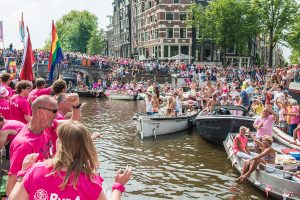On his way to the store in November 2004, Dutch politician Martin Bosma stepped outside of his house and stumbled upon the murder scene of Theo van Gogh. A filmmaker and close friend of Bosma, van Gogh had been shot and stabbed to death in the broad daylight of Amsterdam by a Dutch Muslim man. The crime was a response to van Gogh’s recent film criticizing women’s rights in the Islamic world.
It’s not often that you can pinpoint a single moment as defining a politician’s entire ideology, but as Bosma revealed in his first book, The Fake Elite of the Counterfeiters, “That Tuesday morning the choice was made for me.” Although his views on Islam were radically negative throughout his life, Bosma attributes his extreme anti-immigrant, anti-Muslim views almost exclusively to this one event.
Bosma was not the only Dutch person affected by the murder. Van Gogh’s demise, along with the earlier assassination of popular anti-Islamic Dutch politician Pim Fortuyn, launched an unprecedented rise of Islamophobia in the Netherlands, which has been abetted by Geert Wilders’ growing right-wing Party for Freedom (PVV). As Wilders’ closest confidant, Bosma has been instrumental in popularizing anti-Islamic views in an otherwise broadly tolerant country. The extent to which this pandemic has spread will become evident on March 15th during the Dutch parliamentary elections.
An Unusual Politician
One of the movement’s earliest forerunners was Pim Fortuyn, whose rise to political power was as quick as it was impactful. He won his first political leadership position in August of 2001, and was the favorite for the position of prime minister in the 2002 elections. After being ousted from his position as leader of the political party Leefbaar Nederland (Livable Netherlands) for his anti-Islamic views, he formed the Lijst Pim Fortuyn party, which trumpeted Dutch nationalism and espoused hardline anti-immigration views.
But Fortuyn was the antithesis of the general stereotype of a right-wing nationalist. As an openly gay man, he often frequented gay bars with dress codes calling for ‘no clothes,’ and spoke openly of sleeping with young Moroccan boys. He embraced habits that would destroy political careers in many other countries.

A shot from Amsterdam’s 2014 Gay Pride Parade.
But this being the Netherlands, many Dutch embraced Fortuyn’s unorthodoxies and his fight against Islam. Outside of his xenophobia, Fortuyn held political beliefs largely similar to the majority of Dutch citizens. A supporter of gay and women’s rights, Fortuyn based his anti-Islamic beliefs on the assertion that Islam is not conducive to the type of tolerance embraced in the Netherlands.
In an interview with the HPR, John Bowen at Washington University in St. Louis, an expert on comparative studies of Islam, argued that populists champion “things characteristic of their countries, and [for the Netherlands] that is LGBT rights.” In this respect, Dutch populism differs from that of other countries. Although Fortuyn was often labeled a member of the ‘far-right’ alongside other European populists, his views, and those of his progeny, differ substantially from the sort held by, say, Hungary’s Viktor Orban.
It was for this anti-Islamism, though, that Fortuyn also faced the most criticism. Although he received many death threats, they were taken lightly, as incidents of political violence in the Netherlands were extremely rare. Consequently, the country was shocked when just nine days before the general election in which Fortuyn’s party was expected to win a plurality of seats—putting him in a good position to be elected prime minister—he was shot six times walking to his car from a radio interview.
Dutch Discontent
The murder of Pim Fortuyn, followed by that of van Gogh, shook the Netherlands to its core. According to the Guardian, Fortuyn’s death was the Netherlands’ first political assassination in modern history. Just as van Gogh’s murder triggered the shift in Martin Bosma’s political beliefs, these two murders marked a larger shift towards anti-immigration and Islamophobia among many Dutch citizens. The sentiment had already started with Fortuyn’s rise to the political limelight, but his death attracted the attention of many who did not originally follow him. Oliver Schmidtke, Director of the Centre for Global Studies at the University of Victoria, explained to the HPR that these murders left a deep impression on the Dutch citizenry. “Its more the fear; the fear and the portrayal of, particularly Muslim, immigrants as a genuine threat.” All of a sudden, there seemed to be consequences for speaking against Islam. Through these deaths, the Dutch people faced two great tragedies with one unfortunate link.
This unrest contributed to pre-existing discontent with the Dutch political system, as another apparent failure of the Netherlands’ political establishment. Maarten Vink, a professor of political science at Maastricht University and co-director of the Maastricht Center for Citizenship, Migration, and Development, outlined for the HPR the source of this discontent. “In order to govern, we need various parties to coalesce together. This makes the political system a bit murky.” The Dutch multi-party system encourages parties to work together and govern by consensus, which infuriates voters whose favored policies are lost within a large coalition. These sorts of compromises may be good for political efficiency and the Dutch populace as a whole, but leaves those hoping for decisive action aligned with their own political ideologies sorely disappointed. Schmidtke explained that populist parties are the people’s choice to fix this “crisis of representative democracy,” because “populist parties are not prone to compromise or nuanced policy making.”
The Party for Freedom
The most recent manifestation of this phenomenon is the right-wing populist Party for Freedom (PVV). Geert Wilders, the face of the growing populist movement in the Netherlands, began gaining momentum as an agent of change in the early 2000s. With the aid of Bosma, Wilders founded the PVV in 2006 to advance anti-Islamic ideology. Vink said that “the [anti-Islamic] sentiment is bigger than Wilders himself, but Wilders has kept it alive.” Wilders has repeatedly called for the succession of the Netherlands from the European Union, but is best known for his radical views on Islam. He has called for the eradication of mosques and a complete halt to Muslim immigration into the Netherlands. He claims that his beliefs come purely from a place of disagreement with Islam as a religion and not Muslim people in general. In a 2008 conversation with The Guardian, Wilders said, “I don’t hate Muslims. I hate Islam.” In this way, the PVV aims to garner support from anti-Islamic Dutch voters who nonetheless consider themselves tolerant.
Wilders tells these voters that their aversion to Muslim immigration is warranted, and that their negative or fearful feelings towards Muslim people do not make them racist. Bowen puts a name to this sentiment: “intolerance of intolerance.” Wilders champions his rhetoric as free speech and a representation of how the Dutch people really feel, without jumping through the hoops of political correctness.

Wilders, at a rally for Patriotic Europeans Against the Islamisation of the West, or Pegida.
The PVV expanded in the Netherlands during a time of extreme vulnerability. Pim Fortuyn and Martin van Gogh were popular figures, and Wilders continually frames their murders as the work of a Muslim population intent on muzzling the average Dutch citizen. In turn, his supporters see Wilders as working to protect the rights of persecuted minority groups among them, and therefore furthering the national spirit.
Wilders often uses the fact that he wears a bulletproof vest as evidence for this. In a debate in 2010 with Job Cohen, former mayor of Amsterdam and leader of the Dutch Labor party, Wilders asked “How is it possible that I am forced for almost six years now at any public appearance, even now as I stand before you, to debate with a bulletproof vest and not you? Do you know why this is so Mr. Cohen? Because people who dare to criticize Islam are either killed or they receive hundreds of death threats per year. And the people who do not, the people who fondle Islam, can enjoy their freedom.” Wilders exploits the fear of the Dutch by fanning the embers left by the murders of van Gogh and Fortuyn. The PVV has been able to identify a fear strong enough to incite political action, intensify it, and then present itself as the only hope for safety. Wilders and Bosma have essentially used Fortuyn’s original political strategy, but in a political environment far more accommodating to it.
A Test of Tolerance
On March 15th, this strategy will be put to the test by the Netherlands’ parliamentary elections. Although Dutch elections have been unpredictable recently, as a result of the rapidly-changing political climate, The PVV is polling at a close second to the current Prime Minister Mark Rutte’s party. According to The Telegraph, Rutte’s VVD holds first place with an expected 25 seats, and the PVV is expected to secure 21 seats.
Even if Wilders does receive the most votes, the Netherlands’ multi-party parliament system prevents him from becoming prime minister through an absolute majority. Therefore, if he hopes to accede to the top position, Wilders will need the support of his fellow parliament members, which seems unlikely. Most other major parties have made it known they will not caucus with the PVV, so Wilders will most likely remain in the opposition. This result, though, may actually work in his favor.
Winning the plurality of votes in the March 15th election, but failing to receive the required votes within Parliament to assume the role of prime minister, would fit nicely into Wilders’ anti-establishment shtick. By pointing to a political establishment intent on suppressing the will of the people, Wilders would likely garner further support from many exasperated Dutch citizens. Even outside of the ruling coalition, Schmidtke believes that Wilders’ popularity “changes the environment in which policy is being made.” Other parties have already taken up bits of his anti-Islamic platform in an effort to tap into votes from his core constituency. Pim Fortuyn was a prophet of sorts for this political shift; years after his and van Gogh’s deaths, the movement he pioneered seems ready to enter the Dutch mainstream.
Image Sources: Flikr/Michael Coghlan // Wikimedia Commons/Partij van de Arbeid // Flikr/Metropolitical.org
